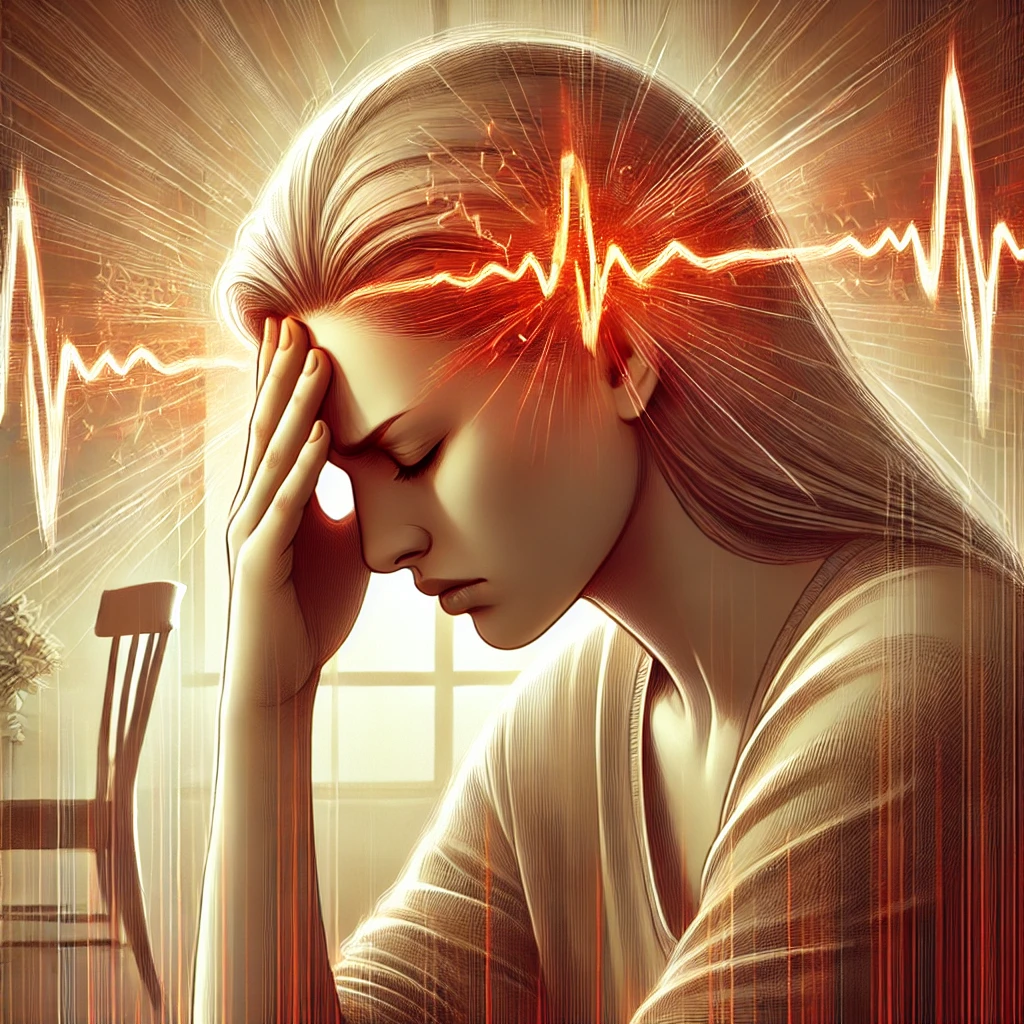ADHD and Physical Illness: Exploring the Overlooked Connection

ADHD and Physical Illness: Exploring the Overlooked Connection
Introduction: The Overlooked Link Between ADHD, Hormones, and Chronic Stress
For women with ADHD, chronic stress isn’t just about managing daily tasks—it’s deeply connected to navigating a world that often doesn’t understand or accommodate their neurodivergence. The pressure to mask ADHD symptoms, meet societal expectations, and cope with misunderstandings creates a heavy emotional and physical toll. Hormonal fluctuations—such as those experienced during menstruation, pregnancy, and menopause—further exacerbate this burden. These prolonged stresses not only worsen ADHD symptoms but also lead to significant physical health issues, impacting everything from the immune system to cardiovascular health and even the aging process.Masking ADHD: A Hidden Source of Chronic Stress
Women with ADHD frequently feel compelled to conform to neurotypical behaviors, leading to masking, which involves suppressing or hiding ADHD traits to blend in. It's so automatic that women often don't even recognize the stress. This practice results in emotional exhaustion and a prolonged stress response. Hormonal changes, particularly during menstruation or menopause, intensify this chronic stress, leading to elevated cortisol levels. This hormonal interplay worsens ADHD symptoms, impairs emotional regulation, and eventually leads to long-term physical health consequences.How Chronic Stress Affects the ADHD Body
Women with ADHD often face heightened stress responses due to societal pressures, lack of support, and the emotional toll of masking. Hormonal changes can amplify these responses, keeping the body in a prolonged state of fight-or-flight. Over time, this state of hypervigilance leads to a host of physical health issues, affecting multiple bodily systems.-
Immune System Suppression
Prolonged stress, especially during periods of hormonal fluctuation, weakens the immune system. Women with ADHD are vulnerable to frequent infections, autoimmune diseases, and chronic inflammatory conditions. Elevated cortisol levels, particularly during hormonal transitions such as menopause, reduce the immune system’s ability to defend against diseases, making women with ADHD more susceptible to conditions like lupus, rheumatoid arthritis, and Hashimoto’s thyroiditis.2. Cardiovascular Problems
Chronic stress contributes to cardiovascular disease by raising blood pressure and heart rate. Women with ADHD are already more vulnerable to stress, and this risk is heightened during hormonal changes, such as those experienced during perimenopause or pregnancy. Elevated cortisol levels, combined with the mental strain of managing ADHD in a stress-inducing world, increase the risk of hypertension, heart attacks, and strokes. Hormonal fluctuations only exacerbate these risks.3. Digestive Issues
The gut, often referred to as the "second brain," is particularly sensitive to emotional and hormonal stress. Hormonal shifts, particularly during menstruation or menopause, can exacerbate digestive disorders such as irritable bowel syndrome (IBS) and gastroesophageal reflux disease (GERD), both more prevalent in women with ADHD. Stress-induced disruption of gut bacteria and slowed digestion add to the physical discomfort, making it more challenging to manage ADHD symptoms.4. Endocrine System Disruption
The endocrine system regulates hormones, which are highly sensitive to stress. For women with ADHD, hormonal imbalances are often worsened by chronic stress. Conditions such as polycystic ovary syndrome (PCOS) and thyroid disorders (e.g., hypothyroidism) are more common in women with ADHD. These hormonal disruptions worsen ADHD-related challenges like fatigue, brain fog, and emotional regulation difficulties, creating a cycle of health challenges that feed into one another.5. Telomere Shortening and Accelerated Aging
Stress accelerates the aging process by shortening telomeres, the protective caps on the ends of chromosomes. Hormonal fluctuations, especially during menopause, intensify stress responses and contribute to premature aging. Women with ADHD, who often live in a prolonged state of stress, are more likely to experience telomere shortening, which increases the risk of age-related diseases such as heart disease and immune dysfunction.6. Neurodivergent Burnout and Constant Fatigue
Neurodivergent burnout is a state of extreme mental and physical exhaustion caused by the continuous effort to manage ADHD symptoms, mask behaviors, and cope with chronic stress. Women with ADHD, especially during hormonal transitions like menopause, experience heightened fatigue and difficulty handling daily responsibilities. This burnout not only impacts mental well-being but also contributes to physical health decline, exacerbating stress-related illnesses.
Five Physical Illnesses Linked to ADHD, Hormones, and Chronic Stress
1. Autoimmune Disorders
Women with ADHD are at a higher risk for autoimmune conditions due to ongoing stress that weakens the immune system, especially during hormonal shifts. Autoimmune diseases such as lupus, rheumatoid arthritis, and Hashimoto's thyroiditis are more common in women under chronic stress. These conditions cause chronic pain and fatigue, compounding the challenges of living with ADHD.2. Cardiovascular Disease
The combination of chronic stress, hormonal fluctuations, and ADHD leads to an increased risk of cardiovascular disease. Conditions such as hypertension, heart disease, and stroke become more prevalent in women with ADHD, particularly during menopause or pregnancy when hormones are in flux. Managing stress and understanding its connection to hormone levels is critical for reducing these risks.3. Diabetes
Chronic stress, exacerbated by hormonal changes, can impact insulin regulation, increasing the risk of type 2 diabetes. Women with ADHD, particularly during perimenopause, may experience challenges in managing blood sugar levels, further increasing the risk of developing diabetes.4. Chronic Pain Conditions
Conditions like fibromyalgia and migraines, more prevalent in women with ADHD, are often worsened by chronic stress and hormonal fluctuations. These pain disorders cause significant discomfort and reduce the quality of life, creating a cycle of physical and emotional stress.5. Ehlers-Danlos Syndrome (EDS)
While Ehlers-Danlos Syndrome (EDS) is not directly caused by stress or ADHD, women with ADHD have a higher prevalence of this connective tissue disorder. Chronic stress and hormonal changes can worsen EDS symptoms, leading to increased pain and fatigue over time.What this Means for You: Empowerment Through Knowledge and Action
Incorporate Mindfulness and Relaxation Techniques
Mindfulness, deep breathing, and relaxation techniques help lower cortisol levels and balance hormone levels. For women with ADHD, these practices offer much-needed moments of calm, helping to reduce the stress that drives physical illness, especially during hormonal shifts.Tailored Stress-Management Strategies: Personalizing Your Approach
Not every stress-management strategy works for everyone, especially for women with ADHD, so it's important to customize your approach. You might find sensory grounding exercises, quick bursts of movement, or nature walks more effective than traditional meditation. The goal is to identify techniques that work with your ADHD rather than against it.Stay Physically Active
Regular physical activity supports both mental health and hormonal balance. For women with ADHD, activities like walking, yoga, or swimming can reduce stress, regulate cortisol, and help manage the physical effects of ADHD. Exercise also aids in balancing hormones during key life stages like menopause.Self-Advocacy: Speaking Up for Your Needs
It’s essential to advocate for yourself when it comes to your health. This means actively communicating with your healthcare providers about how ADHD and hormonal changes impact your physical and mental health. Don’t hesitate to request specific tests, such as thyroid function or cortisol levels, or explore treatments for chronic pain or autoimmune issues that might be linked to stress. For many women, diagnosis and treatment of ADHD itself can reduce stress, improve symptom management, and have a positive ripple effect on overall health. Self-advocacy could also involve pushing back on societal pressures, whether it's in the workplace or social settings, to prevent burnout.Build Supportive Networks
Support systems are crucial for managing stress, especially during periods of hormonal fluctuation. Surrounding oneself with understanding friends, family, or ADHD support groups can reduce the pressure to mask ADHD traits and alleviate stress, helping to balance both emotional and physical health.Reflection: Are You Prioritizing Your Health in the Right Areas?
Ask yourself, “Where am I focusing my energy? Am I putting time into stress management and health, or am I constantly firefighting life’s demands?” It’s easy for women with ADHD to get caught up in trying to stay afloat and overlook their long-term health. Reflecting on this can help you realign your priorities.Self-Accommodation and Self-Care
Self-accommodation is vital for reducing stress and aligning daily routines with one’s strengths. Women with ADHD should embrace the need for accommodations, adjust their expectations, and prioritize self-care, particularly during hormonal transitions like menopause. Practicing self-compassion and allowing for rest helps to mitigate the long-term effects of chronic stress on physical health.Enhancing Self-Awareness: Tracking Symptoms and Hormonal Fluctuations
One way to take action is to start tracking your symptoms, paying special attention to how they change with your hormonal cycle. Use a journal, app, or even a calendar to note down your mood, energy levels, ADHD symptoms, and any physical issues (like migraines, digestive problems, etc.) that flare up. This can help you notice patterns and empower you to prepare for or mitigate these symptoms when they occur.Conclusion: The Path to Better Health Starts with Managing Stress and Hormones
Chronic stress, compounded by hormonal fluctuations, significantly impacts the mental and physical health of women with ADHD. By understanding the connection between stress, hormones, and ADHD, women can take proactive steps to protect their health. Incorporating mindfulness, physical activity, self-accommodation, and building supportive environments can help break the cycle of stress, leading to improved well-being and a more balanced life.Additional Action Steps:
- Educate Your Healthcare Team: Many doctors may not be aware of the links between ADHD, hormones, and physical illness. Arm yourself with the knowledge to help guide the conversation.
- Create Boundaries: Reduce stress by setting boundaries around activities or people who increase your need to mask or heighten your anxiety. This will reduce the overall stress load on your system.
- Prioritize Sleep: Rest is critical for both mental and physical health, especially during times of hormonal shifts. Aim for consistent, quality sleep as part of your self-care routine. This may be hard because you may have a sleep disorder. Here is some info about sleep.
-
Takeaway Box: Empower Yourself to Manage Stress and Hormonal Fluctuations
- Chronic stress linked to ADHD affects your physical health.
- It's not your fault, but you can take control of your health through self-awareness, self-advocacy, and customized stress-management techniques.
- Common conditions linked to this stress cycle include autoimmune disorders, cardiovascular disease, and chronic pain.
- Tailor your health and wellness strategies to fit your unique ADHD needs, using tools like symptom tracking and building supportive, stress-reducing environments.
References
- Gotlib, I. H., LeMoult, J., Colich, N. L., Foland-Ross, L. C., Hallmayer, J., Joormann, J., & Wolkowitz, O. M. (2020). Telomere length and cortisol reactivity in children of depressed mothers. Nature Communications, 11(1), 1281. https://doi.org/10.1038/s41467-020-15113-3
- Greenberg, M. (2018). The Stress-Proof Brain: Master Your Emotional Response to Stress Using Mindfulness & Neuroplasticity. Strawberry Hills, NSW: ReadHowYouWant.
- Levy, F. (2019). Attention-deficit/hyperactivity disorder (ADHD): A stress- and distress-related disorder? Journal of Neurodevelopmental Disorders, 11(1), 4-12. https://doi.org/10.1186/s11689-019-9285-2
- Quinn, P. O., & Madhoo, M. (2017). A review of ADHD in women: The diagnostic process and its implications for mental health. Journal of Attention Disorders, 21(3), 200-208. https://doi.org/10.1177/1087054713493315
- Shaw, P., Stringaris, A., Nigg, J., & Leibenluft, E. (2017). Emotion dysregulation in attention deficit hyperactivity disorder. American Journal of Psychiatry, 171(3), 276-293. https://doi.org/10.1176/appi.ajp.2017.12030338
- Young, S., & Bramham, J. (2021). Emotional dysregulation in women with ADHD: Implications for relationships and hyperresponsibility. Neuropsychiatric Disease and Treatment, 17(2), 505-515. https://doi.org/10.2147/NDT.S292893






